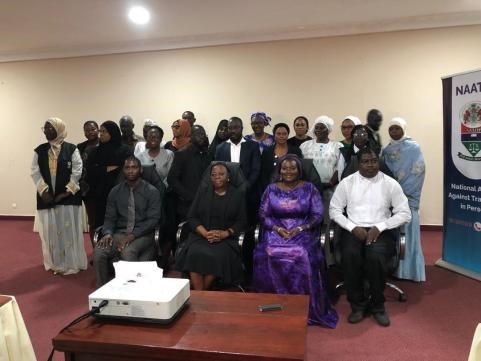By Sariba Manneh
In their unrelenting advocacy to raise awareness and strengthen the capacities of people on issues related to human trafficking, the National Agency Against Trafficking-In Persons (NAATIP) convened a day’s session recently for scores of Magistrates from the judiciary. The event which was held at a local hotel was designed to arm participants with the requisite knowledge for them to be able to recognise cases of Trafficking-In Persons in their pursuit of justice in upholding victims’ fundamental human rights.
The forum also sought to serve as an avenue to provide magistrates with essential knowledge relating to TIP, thus fostering a legal environment that upholds human rights and ensures justice for victims.
Joseph Y. Mendy, head of investigation at NAATIP, underscored the importance of the training especially for magistrates, saying combating human trafficking calls for the collective participation of all and sundry, adding that this is the reason why the agency is keen on conducting series of training to arm people with knowledge on human trafficking. He described the practise as a heinous one and said combating the menace is not just a legal obligation but a moral one in view of its severity to mankind. He maintained that human trafficking is a crime that preys on the most vulnerable of society, and acknowledged that with dedication and commitment of all, this lucrative enterprise will be suppressed.
Isatou Dabo, the executive director of NAATIP, explained that this is a refresher training for all judicial officers, which they have split into two. She said the first phase, is the forum for the magistrates, while the next phase, has plans in place for the same to be conducted for judges of the superior courts.
Ms Dabo explained that the training is necessitated by the fact that when she joined the agency, they conducted counsel sessions for victims of trafficking in persons, every Tuesday.
“On one of these Tuesdays, I walked into the room as the session was ongoing. We had twelve girls who had been trafficked sitting in one room, but my attention was on one of them, who was sitting right at a corner in pale blue jeans, white ‘T’ shirt and braided hair that she probably had for about two to three weeks,” she said. She however lamented that the interesting thing was not the outfit that the girl wore, but the sorrow, frustration, lack of courage and everything that was manifesting itself from the girl’s demeanour and character at that very corner where she sat on that day; That as the session progresses, the girl was allowed to express why she was feeling that way and what she narrated was heart breaking and unimaginable.
Ms Dabo maintained that this calls for action not as judicial officers, but for the sake of humanity because everyone is vulnerable to trafficking in person pointing out that in most cases, perpetrators use very impressive and persuasive tactics to lure people in what seems legitimate but end up being very dangerous and detrimental to the human race.
To this end, Ms Dabo spoke about the gains registered by the agency amid challenges which include the setting-up of a hotline for victims of Trafficking In Persons; 9 cases presented to the Ministry for Justice for legal opinion four of which have been mentioned at the High Court this month and other convictions on trafficking in persons, among a host of others.
Deputising for the Chief Justice of The Gambia, Justice Mary Mam Yassin Sey, deplored that Trafficking in Persons also referred to as human trafficking, is a form of modern-day slavery in which victims are subjected to force, fraud or coercion to compel them to provide commercial sex, debt bondage services or involuntary services.
“Invariably, any minor under the age of 18, involved in commercial sex is a victim of human trafficking,”
Justice Sey said and reminded that in keeping with the terms of her international obligation, The Gambia enacted the Trafficking-In Person Act, of 2007, which she said applies throughout the country and punishes all forms of human trafficking. The Act, she added, criminalises both sex and labour trafficking and prescribed a penalty of 15 years to life imprisonment and a fine of between D50,000 and D500,000. She however pointed out that it is pertinent to note that Trafficking-In Persons (Amendment) of 2010 has amended Section 28 of sub-section (4) of the 2007 Act by substituting the word (fifteen) to the word (fifty) and in sub-section 5 by substituting the word (life imprisonment) with the word sentence of death. This she added, undoubtedly reflects the seriousness of the offense under the Act, affirming that human trafficking is a global issue that requires coordinated effort from various stakeholders including the judiciary.


















